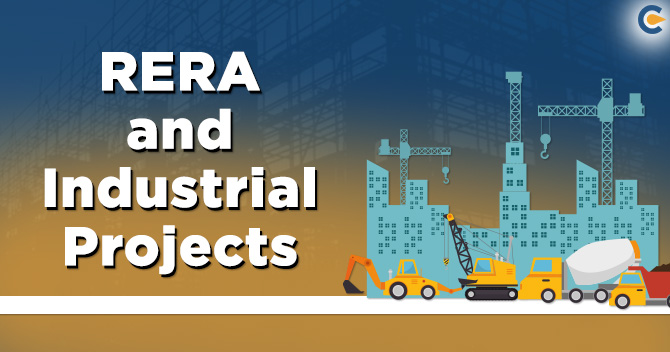The Tamil Nadu Real Estate Appellate Tribunal has upheld a ruling by the Tamil Nadu Real Estate Regulatory Authority RERA (TNRERA) that projects like SEZ and real estate involving the sale of an industrial plot to investors come under the purview of the RERA Act. The verdict comes in the matter of GMR Krishnagiri SIR Ltd, which establishes an exclusive economic zone in Hosur, Krishnagiri district.
Highlights of the Verdict
RERA does not exempt a sale of industrial plots from the definition of the Act. Such industrial projects, which came after implementation of the RERA Act, must be registered. GMR had entered into the memorandum of understanding with (TIDCO) Tamil Nadu Industrial Development Corporation Ltd to develop the project as the joint venture with an infrastructure development company under a public-private partnership model.
- It is of an opinion from the TNRERA on the applicability of RERA for the project. It got a response that the project must be registered with the TNRERA. Against this, the company moved to TNREAT, which noted as TIDCO entered into an MOU by way of facilitating the company to do the real estate business to sell industrial plots.
- The entire Act & legislative history mentioned the sale of plots, apartments,etc. Hence, the very purpose of the enactment is only for the regulation of the sale of plots and flats and not for any else purpose. Therefore, TNRERA has rightly pointed out that the Act has not differentiated plots into housing plots, commercial plots, or industrial plots.
- The ruling only signifies that the State RERA considers all immovable properties under its purview. It is right from the perspective that there will be all-around transparency and efficiency in the State’s real estate sector. The ambit of the RERA is not just limited to a commercial or residential building. It leaves little room for any misadventure in the industry as a whole and an overall fair play.
- The decision appears to be rendered in a context of specific issues raised therein. The tribunal has held that residential, commercial, as well as industrial plots, would be covered. It will have far-reaching implications for real estate projects, which would involve the sale of industrial plots.
What are the issues?


What TNREAT ruling rendered?
The ruling also signifies that the RERA State considers all immovable properties under its ambit. The judgment of TNREAT will give transparency and accountability in the State’s real estate sector. The ruling held that a scope of the RERA is not just limited to commercial or residential buildings. It would also cover residential commercial as well as industrial plots. It will have far-reaching implications on real estate projects, which would involve the sale of industrial plots.
What TNRERA Regulation said?
Tamil Nadu State RERA does not exempt the sale of industrial plots from the definition of the Act. The Act noted that such industrial projects, which came after the Act’s implementation, should be registered.The entire Act mentioned the sale of plots, buildings, or apartments, etc. Hence, the enactment of the RERA Act is solely for the regulation of the sale of plots and flats. Thus TNRERA has pointed out that the Act has not differentiated plots into housing plots, commercial plots, or industrial plots.
Read our article:RERA Complaint or Consumer forum (NCDRC): Which is better?
About Real Estate’s (Regulations and Development) Act, 2016
A Real Estate (Regulation and Development) Act RERA, 2016, is the Act that seeks to protect home-buyers and help boost investments in the real estate sector. Establishment of the Real Estate Regulatory authority under Section 20(1) of the Act requires the establishing the Real Estate Regulatory Authority in each State and acts as an adjudicating body for the speedy dispute redressal.
Salient Provisions
- Property transactions will be subject to a regulator as the state-level Real Estate Regulatory Authority (RERA). RERA Act[1] is intended to perform the same role for the property transactions, as SEBI does for security transactions in the capital markets.
- Every developer involves in any residential project with an area of over 500 sq m or 8 apartments has to be registered with RERA and upload all the project details to a RERA site before he initiates any sale.
- The details uploaded by a developer must include the number and types of homes for sale, site, and layout plan, also the payment schedules, schedule of completion, and quarterly updates on the status of the project too. Hence, RERA maintains comprehensive records for every project across the entire chain, from its conceptualization to its completion.
- Real estate agents are dealing in these projects needed to register with RERAs. It will provide transparency in project-marketing and execution.
- Each state will also have its Appellate Tribunal to decide and deal with real estate disputes.
Importance of Real Estate Project
- Developers deposit 70 % of the sums received from buyers, in a separate bank account earmarked for each project. It must only be used for a construction purpose of that project. The amount can only be withdrawn from the account after it is certified by an engineer, an architect, and a chartered accountant. The withdrawal must be in proportion to the stage of completion of the project.
- The builders have to quote prices based on carpet area and not super built-up area, whereas carpet area has been defined in the Act to include usable spaces such as kitchen and toilets. It will help to home buyers get a picture of the space.
- The Act also has a clear definition of the carpet area: The net usable floor area of an apartment, excluding an area covered by the external walls, areas under services shafts, exclusive balcony or verandah area and unique open terrace area, but includes the area covered by the internal partition walls of the apartment.
- In case the builder wants to change the layout or other plans after the sale, he will require the approval of the two-thirds of buyers in that project, to make such deals.
Penalties
- Both a buyer and a promoter have to pay penal interest at similar rates for missed payment obligations or delayed completion. Any incorrect or incomplete disclosure will attract a penalty of 5% of the project cost. The project can even be canceled if rules are regularly flouted. In case the developers renege on any of their commitments, buyers can complain to the RERAs for redress.
- In case the developer leaves the project halfway, the association of allottees has the right to refuse and also get back their money along with interest. The allottees must also demand that the government authority get the project completed through another developer or other means.
Conclusion
RERA supervises and accepts documents by the promoter of a real estate project for its RERA registration under the TNRERA Act. It also controls the application and renewal of registration for stakeholders, collects charges related to complaints or records, initiates the process of selecting the chairperson and other authoritative members, and focuses on resolving disputes quickly.
Read our article:Penalties under RERA on Builders and Agents










